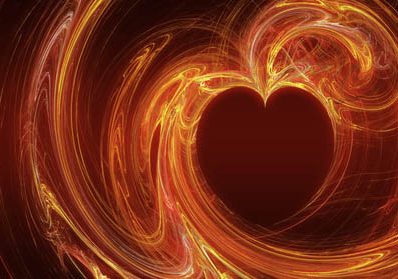About love
What is love?
Unconditional love, that’s usually what we refer to as the highest good within us. And it is! But ask yourself: does conditional love also exist? Or are we actually talking about something else?
We rarely discuss what love essentially is. We see it – and talk about it – as something self-evident that we don’t need to further explain. However, it’s good to thoroughly explore the concept of love to see if we’re all on the same page. If we aren’t, there might be confusion, and our feeling of love might vanish just as quickly.
 How do we experience love? When we observe love within ourselves at moments when we’re filled with it, we can see it emanating from our deepest essence. We then experience it as our true nature. Therefore, we can assume it belongs to the nature of the Absolute itself. It simply exists, during those moments of experience, without us asking for it or having to do anything for it. And it’s there because, during those moments, we are able to let things be and specifically not act.
How do we experience love? When we observe love within ourselves at moments when we’re filled with it, we can see it emanating from our deepest essence. We then experience it as our true nature. Therefore, we can assume it belongs to the nature of the Absolute itself. It simply exists, during those moments of experience, without us asking for it or having to do anything for it. And it’s there because, during those moments, we are able to let things be and specifically not act.
Empathy and compassion
Since we can assume that within us the inner light of consciousness always shines and radiates, even when we can’t experience it due to blockages shielding this inner light, we can also assume that love is always there, but is obscured by something and thus cannot be felt. Love is a feeling experience, arising from an inner state of being, felt (with the heart) and understood (with reason). As a result, we are empathetic and act compassionately towards others and ourselves. It is evoked by natural attachment from our Ahamkara.
What obscures love, which not only manifests in us as a feeling but also externally as compassionate understanding and empathy? What exactly are we doing in our mind that obscures it?
It’s our psychic mechanisms that automatically come into play, which we usually don’t perceive, allowing them to run unchecked in our mind. Without realizing it – in our waking sleep – we become disconnected from our inner Source, our deepest essence, which includes love. We then feel other, often more intense feelings that cut us off from the happiness that love brings, in short, feelings that make us unhappy because we cling to some form of identification.
So, we need to understand these mental mechanisms before we will be able to give unconditional love in us the space to fully manifest at all times. We gain insight into this mental automatism by discovering, recognizing, naming, re-evaluating, and then giving up on it, so that its efficacy dissolves. Psychic obstacles essentially form a thick fog that can dissipate when our inner light shines on it and radiates it away, just like the sun dispersing morning mist. Whenever they reoccur, because they are triggered from the outside each time, we recognize them earlier and they have less power. Our deep desire to experience love, in unity with everything and everyone, ensures that we don’t give up on giving up internal obstacles.
Unconditional love endures everything
but doesn’t have to accept everything.
But there’s more to say: when we feel love for another person, it doesn’t mean that we should always find that person endearing. We can love individuals who misbehave, or could even harm us. This can be seen in parents who have unconditional love for children who go overboard. Also, we don’t always have to be kind to the one we love. In the ‘game’ of dual life, there will always be friction or tension between us and others that can lead to anger (nothing wrong with anger) but also to a guided neutralizing action, either self-reflectively expressive or introspective. Naturally, this only applies if we remain self-aware with our Observer and don’t fall into the waking sleep where we are cut off from our Source and true Knowledge.
Good intentions
We often see this attitude among well-intentioned people: they resolve to live only from love. This will undoubtedly result in a loving and peaceful outcome if there’s an inner silence from this intense desire and we don’t encounter setbacks or unpleasant triggers. However, this can quickly be disrupted as soon as something occurs that drives away inner peace, giving the previously mentioned mechanisms a full chance to manifest. This results from not putting in enough effort to relinquish and dissolve those inner mechanisms, meaning there’s fundamentally no basis on which love can be felt and experienced, regardless of the situation.
The essential desire to live from love comes from the heart. The decision to live by this 24/7, however, comes from the mind, and what comes from the mind can easily be disturbed by feelings arising from external circumstances or the behavior of others that trigger something old within us. The loving attitude – which is different from love itself – can suddenly shift to the opposite. It’s not uncommon for a loving attitude to turn into irritation or even hatred and exclusion.
If this is the case, we know we need to examine our mental fog to find out precisely what is causing our wish for love to be suppressed. To then name, recognize, re-evaluate, and give it up.
True or not true
When we realize that true love belongs to the imperishable aspects of the nature of the Absolute – just like beauty, silence, eternity, infinity, etc. – we will also see that love that arises at one moment and disappears at another cannot be true love. Something that is truly True – with a capital T – is always true and cannot fluctuate, not even in intention. Therefore, we must be careful not to confuse temporary feelings of love with essential unconditional love. Temporary love arises from being temporarily at peace or originates from identifications and disappears through other identifications.
Of course, every feeling of love is also a reflection of the loving nature of the Absolute, no matter how tunnel-visioned it manifests in our mind. For many people, for example, there exists an identification-based love for animals: the love for a pet, which is genuinely felt, but contrasts sharply with eating factory-farmed chickens. It is clear that unconditional love can never exclude animals in industrial farming.
Another example: the love for a football club may seem unconditional in someone’s experience, but it’s not because it creates opposing clubs which aren’t loved. Only unconscious identification gives rise to these limited feelings of love and connection. Identification is, however, temporary (however long it sometimes lasts), and the feelings of love that arise from it are thus also temporary and not unconditional. Much of that love is directed at oneself.
And then… infatuation. What does this have to do with love?
Infatuation originates from our essence. We feel strongly drawn to someone, again thanks to our ‘connecting instrument’ Ahankara. We want to become one with that other person. At full strength, our outgoing flow of love is projected onto a single person from a powerful essential need that must be fulfilled. From our essential nature of love, as described above, our primal, instinctive wish is triggered to create new life from this union. We understand this as the need for physical union: loving sex.
At full strength, our outgoing flow of love is projected onto a single person from a powerful essential need that must be fulfilled. From our essential nature of love, as described above, our primal, instinctive wish is triggered to create new life from this union. We understand this as the need for physical union: loving sex.
This projection is essential for our survival. From this infatuation, a lasting bond can emerge; a continuous exchange of essential love energy between two people. What’s more, through a powerful and enduring love relationship with our partner, we can come to self-realization more effectively.
Unfortunately, we often see that this is not the case and that a passionate projection of love onto that one person – as a potent unconscious identification – turns into a projection of the opposite, which obscures our (unconditional) nature of love, resulting in: conflict, pain, hatred, separation, and so on.
Since love belongs to the essence (the nature) of the Absolute, nothing can be excluded from or for it. On zelfkennis.nu, several mechanisms are described that shield (unconditional) love so we can’t experience it. We can recognize the presence of these mechanisms by the fact that there is no peace within us and we dwell in negativity. For when there’s love… there’s peace, and when there’s peace… there’s love, for love and peace know no opposition.
.
Relevant pages:
- Our ‘story’
- Identification
- Internal consideration
- Stress
- Impatience
- Wanting
